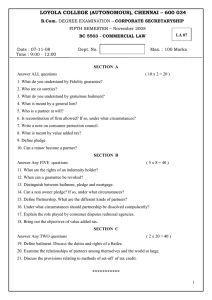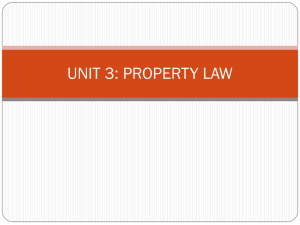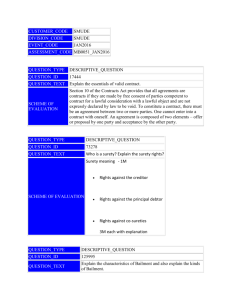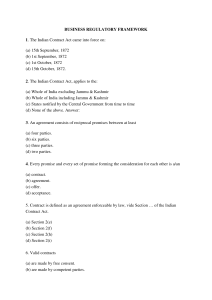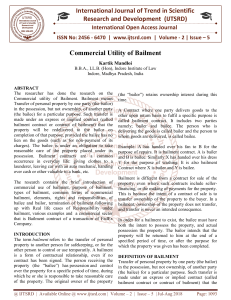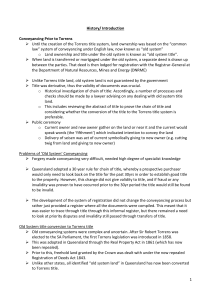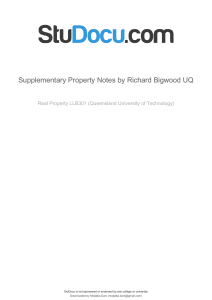Business Law Chapter 8 Study Guide
advertisement
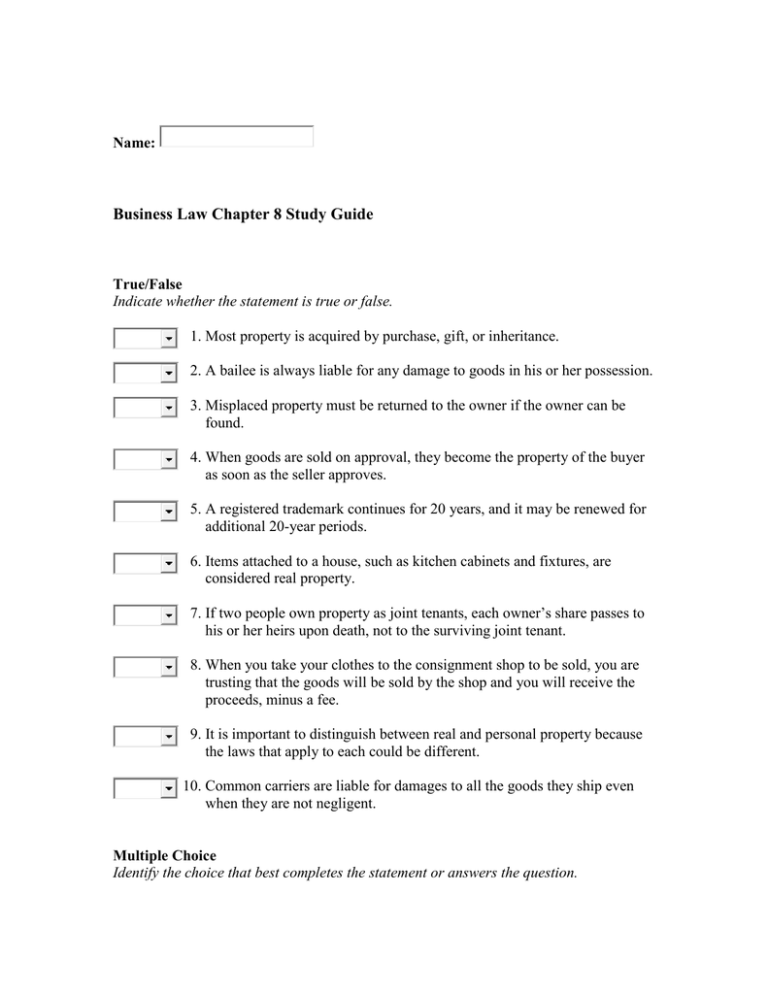
Name: Business Law Chapter 8 Study Guide True/False Indicate whether the statement is true or false. 1. Most property is acquired by purchase, gift, or inheritance. 2. A bailee is always liable for any damage to goods in his or her possession. 3. Misplaced property must be returned to the owner if the owner can be found. 4. When goods are sold on approval, they become the property of the buyer as soon as the seller approves. 5. A registered trademark continues for 20 years, and it may be renewed for additional 20-year periods. 6. Items attached to a house, such as kitchen cabinets and fixtures, are considered real property. 7. If two people own property as joint tenants, each owner’s share passes to his or her heirs upon death, not to the surviving joint tenant. 8. When you take your clothes to the consignment shop to be sold, you are trusting that the goods will be sold by the shop and you will receive the proceeds, minus a fee. 9. It is important to distinguish between real and personal property because the laws that apply to each could be different. 10. Common carriers are liable for damages to all the goods they ship even when they are not negligent. Multiple Choice Identify the choice that best completes the statement or answers the question. 11. When a bailor lends goods without charge, he or she creates a a. bailment by necessity. c. mutual-benefit bailment. b. gratuitous bailment. d. pledge. 12. If you find abandoned property, you a. have the legal duty to try and find the owner. b. must advertise in the local paper for the owner. c. may keep it. d. must leave it where you found it. 13. The person making a gift is a a. bailor. b. donor. c. giftor. d. donee. 14. Patents, copyrights, and trademarks refer to a. tangible personal property. c. bailments. b. intangible personal property. d. intellectual property. 15. If you have in your possession something that belongs to someone else, you are a a. donee. c. donor. b. bailee. d. bailor. 16. Hotel keepers are not liable for the loss of their guests’ property when it occurs as a result of a. an accidental fire when the hotel keeper is not negligent. b. theft in the hotel lobby. c. a faulty in-room safe. d. a broken hotel room window. 17. Common carriers are liable for damages to the goods they ship as a result of a. the inherent nature of the goods. c. an act of God. b. driver accident. d. the shipper. 18. In a bailment, there is no a. intent to provide any standard of care by the bailee or bailor. b. intent to pass title to the property. c. obligation to return the property to the bailor. d. obligation for the bailee to care for the property. 19. Community property is property that a. has been abandoned and is available for purchase through auction. b. is received as a gift by two or more recipients. c. belongs to both spouses equally. d. belongs to the local neighborhood and is used as a park or playground. 20. Which of the following is NOT considered personal property? a. a house c. trademarks b. CD players d. ceiling fans Completion Complete each statement. 21. Anything that can be owned ,other than real estate, is called ____________________. 22. A(n) ____________________ is granted to an author, composer, or artist. 23. All bailees have a duty to exercise a certain ____________________ of the property in their possession. 24. A(n) ____________________ takes place when a person leaves his or her property in another's possession. 25. When you take clothing to a dry cleaner, a(n) ____________________ bailment takes place. 26. A distinctive mark, symbol, or slogan used by a business is a(n) ____________________. 27. The owner of a patent has exclusive rights to his or her invention for a period of usually ____________________ years. 28. If someone owes you money, the right to receive the money is called ____________________ personal property. 29. ____________________ are businesses that transport persons, goods, or both. Matching Match each term with its definition. a. personal property f. b. intangible personal property g. c. intellectual property h. d. copyright i. e. trademark j. bailment gratuitous bailment special bailment mutual benefit bailment patent 30. Property that cannot be touched such as debts or patents 31. The transfer of a possession and control of personal property to someone else, with the intent to return it at a later time 32. A bailment for the sole benefit of the bailee 33. Occurs when you leave your car at a garage to be repaired; when it is fixed, the mechanic receives payment for the service 34. Anything that can be owned, other than real estate 35. A right granted to an author, composer, photographer, or artist to exclusively publish and sell an artistic or literary work 36. A grant giving an inventor the exclusive right to sell the invention for a period of time 37. Bailment for the sole benefit of the bailor 38. A distinctive symbol or slogan used by a business to identify and distinguish its goods from products sold by others 39. Inventions, works of art, software, and logos Short Answer 40. Differentiate between a sale-on-consignment and sale-on-approval, and give an example of each.
